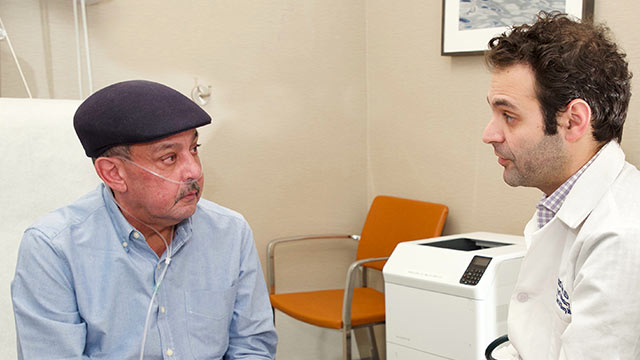
Pulmonology and Respiratory Institute
Whether you have asthma, sleep apnea, or another lung-related problem, the lung specialists at Mount Sinai-Union Square can help. The Mount Sinai Respiratory Institute brings you the most innovative medicine and advanced health care through pioneering research and pushing the limits of discovery in clinical trials.
To schedule an appointment, please call: 212-420-2377.
We specialize in asthma, chronic obstructive pulmonary disease, pulmonary hypertension, lung cancer, interstitial lung disease, and chronic lung disorders, as well as breathing disorders that affect your sleep patterns, such as sleep apnea.
At Mount Sinai-Union Square, you will see one of our top pulmonologists—doctors who specialize in conditions of the lungs—and together decide what works for you. If it’s decided that treatment is the best course of action, you will have a team of specialists working with you.
In our commitment to bring you the best care possible we often will collaborate with many other specialists throughout the Mount Sinai Health system. Our multidisciplinary approach to lung cancer and other lung conditions includes screening, diagnosis, smoking cessation, and treatment. From the time of diagnosis through treatment, everything is conveniently located, on site, in your community.
Conditions We Treat
Our team approach to medicine really makes a difference in treating your lung condition. By collaborating with other physicians at Union Square and throughout the Mount Sinai Health System, your pulmonologist can draw on many disciplines, including specialists in rheumatology, allergy and immunology, gastroenterology, cardiology, and infectious conditions to help map the best treatment path for you.
The physicians at Mount Sinai-Union Square have faculty appointments at the Icahn School of Medicine at Mount Sinai, one of the nation’s leading medical schools. We treat a variety of lung conditions, including:
- Asthma—we provide a comprehensive and individualized treatment plan that includes our state-of-the-art injectable biologic medications to help you live life without asthma symptoms.
- Complex pulmonary disease—with a diagnostic ultrasound on site, our pulmonologists can diagnose and treat a variety of pulmonary conditions, reduce the risk of breathing problems, and help you breathe easier with these conditions.
- Lung cancer—a team of specialists will diagnose and ensure that you are receiving immediate referrals to start you on treatment as quick as possible. You can choose long-term follow-up during and after your recovery period. We recommend that patients not smoke, and if you are trying to quit smoking, we provide smoking cessation programs that can help.
- Pulmonary embolism—we provide treatment options to prevent blockages in your lungs and reduce the health risks related to this condition.
- Smoking cessation—we provide one-on-one counseling to help you stop smoking, improve your lung health, and minimize the risk for a wide range of lung conditions.
- Venous thromboembolism (VTE) —our VTE Clinic can help you by minimizing the risks associated with VTE. We provide treatment to prevent blood clots from occurring and that can help dissolve existing blood clots. We also monitor you carefully for any long-term complications, such as high blood pressure (hypertension).
We also provide onsite infusions and radiation therapy.
Diagnostic Services We Provide
Diagnosing lung conditions can take time, but at Mount Sinai-Union Square, our state-of-the-art imaging facilities and onsite labs enable us to provide you with accurate results quickly. All of our imaging facilities are centrally located on site and can quickly provide a variety of detailed images, using the following:
- X-ray—a type of image that is created by passing high energy X-rays through your body and recording its absorption rates
- Computerized tomography (CT)—scans that are produced through a series of X-ray images taken from various angles and processed by a computer; these provide more resolution than an ordinary X-ray
- Magnetic resonance imaging (MRI)—scans that produce images of internal organs and structures by using magnetic fields and radio wave pulses
- Ultrasound—uses sound waves to produce pictures of the inner body
- Echocardiography—similar to an ultrasound, this uses the heart’s beat and its echo to create an image of the heart
- Positron emissions tomography (PET)—these scans use a combination of computed tomography (CT) and a radioactive material referred to as a “tracer.” As the body absorbs the radioactive material, a three-dimensional image can be created. It can also be used to view how the body processes different chemicals.
We also perform lung cancer screenings, using a low-dose chest CT scan that minimizes your exposure to radiation.
Blood tests and lung function tests are important diagnostic criteria; in some instances, a lung biopsy may be indicated as well. If you along with your doctors decide that any of these tests are required, everything can be done on site at your earliest convenience.
To diagnose a venous thromboembolism (VTE), we use a combination of blood tests and various screening procedures. Screening for VTE is especially important if you have cancer, have recently had surgery, have been immobilized, are using certain hormones, and have a personal or family history of VTE.
Sleep Center
In addition to diagnosing and treating sleep disorders, our sleep program works closely with our weight loss, bariatric surgery, and ear, nose, and throat (ENT) programs to address the non-pulmonary conditions that may be affecting your sleep.
To diagnose your condition, our Sleep Center may prescribe a home sleep study for you, and if necessary, we will perform an on-site sleep study. If you receive a diagnosis of obstructive sleep apnea or another sleep disorder, we may prescribe surgical or nonsurgical options, including:
- Continuous positive airway pressure (CPAP)—a mask that you wear while you sleep to provide a continuous flow of air
- Dental devices—to keep your airway open during sleep
- Procedures—including nasal surgery to correct a deviated septum
National Expertise
Mount Sinai Health System, whose flagship hospital, The Mount Sinai Hospital, is recognized by U.S. News & World Report as being one of the nation’s best hospitals. Our physicians have faculty appointments at the Icahn School of Medicine at Mount Sinai, one of the nation’s leading medical schools.